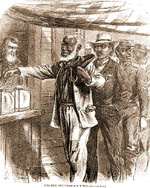 In November, 1868, the newly freed slaves in South Carolina turned out to vote in the first presidential election they had ever been allowed to participate in. It was a momentous occasion; hundreds of thousands of persons who had been deprived of their rights for centuries were now finally able to enjoy all of the privileges of citizenship, including the right of suffrage. Voting in the 1860s meant travelling long distances to the county seat to cast a ballot, often requiring an overnight stay; it was an arduous process, but they were eager to make the attempt.
In November, 1868, the newly freed slaves in South Carolina turned out to vote in the first presidential election they had ever been allowed to participate in. It was a momentous occasion; hundreds of thousands of persons who had been deprived of their rights for centuries were now finally able to enjoy all of the privileges of citizenship, including the right of suffrage. Voting in the 1860s meant travelling long distances to the county seat to cast a ballot, often requiring an overnight stay; it was an arduous process, but they were eager to make the attempt.
But many in 1868 found that they had made the trip for nothing. Armed militias of whites, determined to prevent blacks from voting, arose all across the South, particularly in South Carolina. Acting at the direction of Democratic party leaders, these bands of vigilantes, sometimes calling themselves Ku Klux Klans, confiscated Republican ballots, threatened prospective voters, and assassinated Republican candidates for office. On the two days of the November election, hundreds of armed whites rode all over upcountry South Carolina, surrounding polling stations and preventing blacks from entering. The tactic was a success; blacks were denied the right to vote in several South Carolina counties, and the local Democratic ticket was elected by large majorities in all of them.
And so, it is a measure of the distance we have come in 140 years, that yesterday an African-American man was elected as President of the United States, on the Democratic Party ticket, in an election that was almost entirely peaceful.

Great observation. Most of that progress, moreover, came in the past 50 years.
I did not vote for President-Elect Obama, but his election both reflects racial progress and itself constitutes an act of reconciliation. I would have preferred someone like J.C. Watts or Michael Steele, but, ideology aside and without intending to wave away persisting discrimination, there is something redemptive in the election of an African-American President.